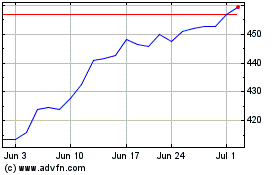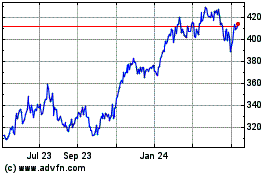By John D. McKinnon in Washington and Deepa Seetharaman in San Francisco
Federal regulators opened a new front in their investigation of
big tech firms, seeking to determine whether the industry's giants
acquired smaller rivals in ways that harmed competition, hurt
consumers and evaded regulatory scrutiny.
The Federal Trade Commission on Tuesday ordered Amazon.com Inc.,
Apple Inc., Facebook Inc., Microsoft Corp. and Google owner
Alphabet Inc. to provide detailed information about their
acquisitions of smaller firms over the last decade.
The new probe likely will involve hundreds of transactions that
never came under federal scrutiny because they were under the
dollar-value threshold for antitrust review, which will rise to $94
million for 2020, officials said.
"This initiative will enable the commission to take a closer
look at acquisitions in this important sector, and also to evaluate
whether the federal agencies are getting adequate notice of
transactions that might harm competition," said FTC Chairman Joe
Simons.
Mr. Simons said the investigation could lead regulators to seek
to unwind improper acquisitions. It could also lead the commission
to consider rule changes or other action to broaden the scope of
acquisitions that come under review, he said.
"We look forward to working with the FTC to answer their
questions," a Microsoft spokesperson said. Representatives for
Apple, Facebook, Alphabet and Amazon representatives didn't reply
to requests for comment.
The move marks a significant expansion of the government's
already extensive examination of possible antitrust concerns in
digital markets. Both the FTC and the Justice Department have been
conducting antitrust investigations of tech giants including Google
and Facebook.
Critics contend big tech firms' acquisitions show a pattern of
establishing "kill zones" around themselves to prevent upstart
rivals from posing a competitive threat, and say this can
discourage innovation and investment.
Defenders of the tech giants say a small startup's prospect of
being taken over by a major company -- and the big payoff that can
result -- is a spur to investment and innovation. Many tech
entrepreneurs start companies with the specific goal of being
bought by one of the giants.
Mr. Simons said the study was prompted by the large number of
acquisitions that have escaped federal review and "whether there's
something we need to change going forward."
The top five tech firms have made more than 400 acquisitions
over the last decade, a blue-ribbon antitrust panel in the U.K.
said in March.
Doug Melamed, a Stanford law professor, said the study announced
Tuesday "might be more about building a consensus or road map at
the commission" on how to proceed in the complex area.
Small acquisitions put "a real burden on antitrust enforcers" to
prove that they are anticompetitive, he said. Moreover, certain
deals that meet the $94 million threshold can escape review under
current rules, FTC officials said. That value threshold has varied
over the 10-year period the agency will be examining.
The FTC also is looking at acquisitions that don't involve
full-fledged takeovers. Those deals will include examining
potential competitive impacts of minority investments, as well as
data acquisitions and licensing arrangements.
The FTC action reflects growing concern in Washington and around
the country that some U.S. tech companies have grown so large and
powerful that they are squelching competition in various ways and
harm consumers.
Sen. Richard Blumenthal (D., Conn.), a critic of big tech
companies, said he welcomed the FTC action, but warned that "it's
no substitute for action."
"It has been clear for a decade that Big Tech is stifling
innovation through its catch-and-kill tactics and unfettered market
dominance," he said in a statement. "Every time that Google,
Amazon, Apple, and Facebook acquire the latest cutting-edge
artificial intelligence startup, innovative wearable device or
emerging social network, they irreversibly squash another
generation of novel competitors that could benefit consumers and
bolster our nation's technological advancement."
Sandy Kory, co-founder and managing director at boutique
technology M&A firm Horizon Partners, said many deals clinched
by the five technology companies were likely to have fallen below
the FTC's threshold for review, and that in many cases the aim was
to buy technology or engineering staff, rather than a stand-alone
business that could flourish like YouTube or WhatsApp
Many recent deals by Facebook and other tech giants have been in
artificial intelligence, an area where tech companies are
increasingly investing.
Mr. Kory said it was hard to see the antitrust case in major
tech companies snapping up small, unproven companies so they can
hire engineers well-versed in cutting-edge technology. "It's
uncharted territory to say, You have too many smart people at your
company."
Scrutiny from Washington already has been forcing some changes
in how Silicon Valley does business.
At Facebook, CEO Mark Zuckerberg has formed a sizable team
within the company to develop dozens of new apps because he isn't
confident the social-media giant will be able to get significant
acquisitions approved in the near term, according to a person
familiar with the matter.
The company has previously had great success in turbocharging
its growth through timely acquisitions of competitors including
Instagram and WhatsApp.
In last week's earnings report, Alphabet CEO Sundar Pichai
nodded toward divestitures of some of the conglomerate's
outer-lying arms, saying he expected them to take on outside
investors.
In addition to the FTC and the Justice Department scrutinizing
possible antitrust concerns involving certain major firms, the FTC
announced in early 2019 that it was creating a task force to
examine potential antitrust violations across the tech
industry.
The FTC has been particularly focused on re-examining mergers
that have been approved by the government. That re-examination
could eventually lead the FTC to try to unwind deals that it finds
to be having anticompetitive effects now, officials have said.
--Rob Copeland contributed to this article.
Write to John D. McKinnon at john.mckinnon@wsj.com and Deepa
Seetharaman at Deepa.Seetharaman@wsj.com
(END) Dow Jones Newswires
February 11, 2020 17:33 ET (22:33 GMT)
Copyright (c) 2020 Dow Jones & Company, Inc.
Microsoft (NASDAQ:MSFT)
Historical Stock Chart
From Mar 2024 to Apr 2024

Microsoft (NASDAQ:MSFT)
Historical Stock Chart
From Apr 2023 to Apr 2024
